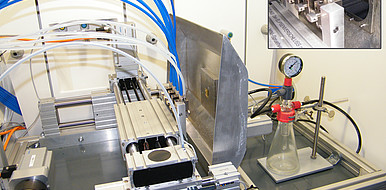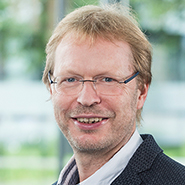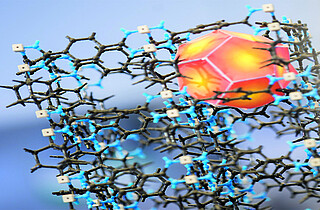Customized pores

In micro- and nanotechnologies, gas reactions are controlled by sensors and catalytic reactions are studied. For this purpose, so-called MOFs (metal-organic frameworks) are applied. A MOF is a metal-organic structure organized like a framework. In the cavities, called pores, gases or other substances may be stored. The minute framework structures consist of inorganic binders, often metal ions, connected by organic rods. Depending on the binder and the rods, one-, two- or three-dimensional crystalline structures with pores of up to 10 nm in diameter are formed.
State of the art
Conventional methods to produce MOF powders on the ton scale have been available for some years already. For many applications, however, MOF layers firmly attached to substrates are required. The only method existing to produce high-quality coatings of this material is based on a manual immersion process or use of an automatic immersion robot. This process is very time-consuming and the MOF layer produced is limited to some dozen layers in thickness. Coatings of more than 100 nm in thickness are very difficult to produce.
Technology
Scientists from the Institute of Functional Interfaces (IFG) have now developed a process, by means of which high-quality surface coatings can be produced more efficiently using various MOF types. A new spraying system allows for a homogeneous application of MOF structures in layers. For this purpose, the surface of the substrates (glass, metals, semiconductors) has to be pre-treated.
Advantages
Depending on the binders and rods selected, the size and shape of the pores and their chemical functionality can be adjusted. The process takes place automatically, chemical reaction times are minimized. The new process allows to spray larger substrate areas. Maximum thickness of the MOF layer is much higher. Thicknesses of several micrometers can be achieved easily.
Options for companies
KIT looks for partners for the industrial use of the process.
Your contact person for this offer

Innovation Manager Karlsruhe Institute of Technology (KIT)
Innovation and Relations Management (IRM) Phone: +49 721 608-25587
Email: rainer.koerber@kit.edu

